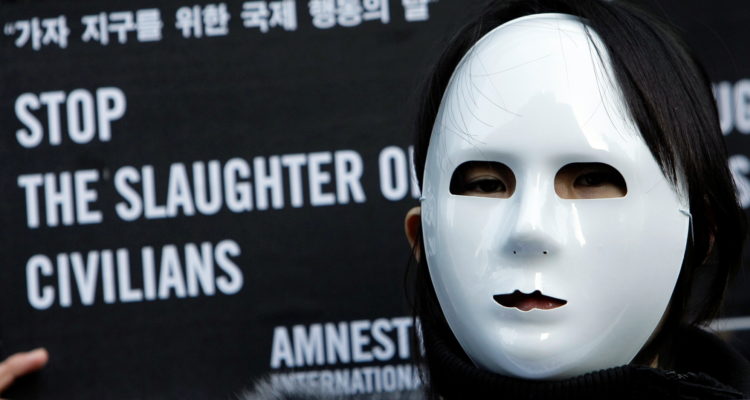The conference addressed the key challenge of motivating the global human-rights movement to “become a part of the solution to the age-old threat of anti-Semitism, rather than part of the problem.”
By Eliana Rudee, JNS
Anti-Semitism has increased dramatically in the past decade, particularly in Europe and North America, with college campuses, work places, political parties, social media and civil society becoming fertile ground for violent extremism and hateful ideologies.
Hoping to contribute to the public dialogue about best practices that effectively confront the virulent uptick in anti-Semitism, Jerusalem-based research institute NGO Monitor hosted a conference on Dec. 18 in Tel Aviv titled “The Future of Human Rights in an Era of Increased Anti-Semitism.”
The conference brought together experts, policy-makers and other influencers to address the key challenge of motivating the global human-rights movement to “become a part of the solution to the age-old threat of anti-Semitism, rather than part of the problem.”
In his opening address, NGO Monitor president and founder Professor Gerald Steinberg maintained that when the universal declaration of human rights was presented in the shadow of the Holocaust, it contained an important message and obligation of the international community to never again allow a power like Nazi Germany to commit genocide against the Jewish people or any other people.
“Their failure to intervene was supposed to be a lesson for all of humanity,” he said.
“Here we are 70 years later, seeing anti-Semitism on a daily basis in many different forms,” he continued.
“NGOs that have spent and received billions of dollars that are supposed to be the guardians of universal human rights have become the purveyors of that same poison. We must not just sit and discuss the nature of that process, but focus on the ways to return the world of human rights to its moral and ethical foundations, effectively addressing the anti-Semitism we see in many different forms.”
Conference speakers included Natan Sharansky, chair of ISGAP; Isaac Herzog, chairman of the Jewish Agency; Elan Carr, U.S. special envoy for monitoring and combating anti-Semitism; and Brig. Gen. (Res.) Sima Vaknin Gill, former director general of Israel’s Ministry of Strategic Affairs, among others.
Many of the speakers referred to the challenge of global anti-Semitism as coming from multiple channels. “There is no one form of anti-Semitism,” stated Steinberg.
“The sources of anti-Semitism today are threefold with the rise of the ethnic supremacist far right, the Israel-hating radical left and militant Islam — the chief source of violence facing Jewish communities in Europe,” said Carr.
“These groups should hate each other more than everything on earth, but instead they are united by their hate of Jewish people and their fundamental incompatibility of their worldview on which the U.S. and every tolerant, free, peace-loving country was built,” he continued.
Itai Reuveni, communications director for NGO Monitor, similarly maintained that “whether anti-Semitism is new, old, left, right or extremist, it’s all the same. Different excuses, same result: hatred for Jews.”
Gill also framed anti-Semitism and the delegitimization campaign as a threat coming from various sources. The campaign to counter delegitimization, she maintained, must be an offensive, data-driven and collaborative campaign, much like a military operation, in order to effectively address the “clear and immediate threat to our security.”
Solutions to the rise in anti-Semitism can be found through innovative methods of education, said speaker Katrina Moravcová, Deputy Ambassador of Czech Republic.
Carole Nuriel, Israel director of the Anti-Defamation League, said that a comprehensive solution for each region, including legislation, social media and safe spaces for conversations about Israel, could better address the challenges related to anti-Semitism.
Carr suggested educating children in philo-Semitism (love for the Jewish people), so that “every kid in every classroom in every country knows about the profound and beautiful contribution that the Jewish people have made to their country.”
Various speakers posed that they were “cautiously optimistic,” including Steinberg.
“In part as a result of our efforts, a number of governments have enacted policies that marginalize anti-Semitic groups,” he said.
“In this respect, the importance of the working definition of anti-Semitism adopted by the International Holocaust Remembrance Alliance (IHRA) cannot be overstated,” he said, referring to the international task force that works to strengthen Holocaust education.
So far, dozens of countries have signed onto the IHRA definition of anti-Semitism, which states that illegitimate criticism of Israel is anti-Semitism, including double standards and comparing the Israeli government to Nazi Germany.
In a world where “You call yourself an anti-Semite and they’ll run you out of town, but if you call yourself an anti-Zionist, they’ll give you tenure,” Carr said that defining objective standards of anti-Semitism is a good start to fighting hate within governments and societies.
“We have articulate, impassioned, committed leaders who are 100 percent committed to the fight against anti-Semitism,” added Carr. From heads of state and ministers to parliamentarians, he said, “anti-Semitism coordinators around the world understand that it’s a critical fight—not just for the Jewish world, but for the better world to which we all aspire.”
Carr referred to U.S. President Trump’s historic declarations on Jerusalem as the eternal capital of Israel, sovereignty over the Golan Heights and Jewish settlements as in accordance with international law, saying, “Despite rising anti-Semitism, the most powerful country in the world is still the most philo-Semitic country in the world.
“The United States doesn’t tolerate its Jews, the United States loves its Jews; and the United States today is led by a president and an administration committed in unprecedented fashion to the fight against anti-Semitism, to the protection of the Jewish people throughout the world and support for the State of Israel … You’ve got America in your corner in a big way.”
“There is cause for optimism in this fight and this eternal struggle of history’s most enduring evil,” he said in summary.
“There is reason to celebrate and rejoice that we are making gains, and building a more just and decent world that our children and grandchildren deserve.”





